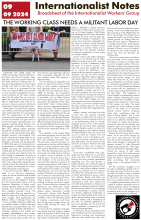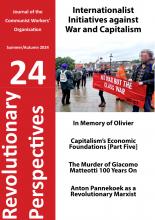November 2024
MDF presentation on the EU
Below is the introduction to the MDF meeting on the EU for those unfortunates who cant make it.
EU in crisis
Lots of bullshit talked about EU in Britain about European dictatorship bureaucracy, federal monolithism and so forth. In UK it has become an aunt sally to blame for all ills and anti-EU rhetoric has been a major source of and outlet for the resurgence of nationalism in recent decades. Interestingly the pro and anti EU argument cuts right across the left and ring parties. Hopefully left communists can agree however that we would neither vote for or against it but see quite straightforwardly as one part of the modern day capitalist state structures.
History
Planning for some sort of European community began during WW2 alongside planning for NHS etc as encouragements to keep the population fighting with images of a better society after the war. The EUs stated objectives were firstly to prevent another war reappearing in Europe esp between France and Germany and secondly economic reconstruction. This was supported by Britain but for European countries - not for the UK which still saw itself as a world power with a Commonwealth and special relationship with USA to rely upon
With the splitting of Europe into US and Russian spheres of influence then it immediately gained strategic as well as economic importance.
The EU began life with 6 countries basically those defeated and trashed by WW2.
The 50s saw early attempts to implement some sort of European community including a Single European Army and eventually the European Coal and Steel comm. The latter is clearly evidence of the focus on reconstruction. In addition, economically the major aspect of the EUs activities related to agriculture and food supply and this still remains the largest item of EU expenditure.
UK joined in the first expansion in 1972 as the economic crisis hit and its relationships with the ex empire and the USA became obviously less beneficial.
There are now 28 countries with a total population of about 500m. 19 of those have the euro as their official currency
What is the EU
Whilst the main area of expenditure has been agriculture, probably the main objective has been an increase in economic efficiency for member economies ie the reduction of production and trading costs. To do this the general philosophy (apart from agriculture) has basically been a private enterprise and free market based ideology.
Throughout 60s to 90s EU had a much less productive economy than America and Japan and the goal of main bits of EU legislation – the single market and euro legislation – were attempts to redress that
Today the EU as a whole has a larger economy than any single country in the world but remains less efficient than the USA (the EU economy is a bit larger than the USAs but its population is much larger). Japan’s economic problems mean it has fallen behind the EU. China and Russia are markedly less efficient. The EU accounts for 25% of world trade and 20% of global gdp
EU’s role in capitalism
So what function does the EU perform with capitalism. It is a supranational organisation - Nations or state governments join not people, and on joining, certain elements of national state functions pass over to EU. Essentially there is a division of labour with the EU taking on a role as an economic government whilst leaving political and social control to national governments (apart from possibly visa systems to control inward migration). Despite the rhetoric in the UK, this is effectively a federal structure already.
This does mean a lessening of authority in each national state. and there lies the core contradictions for the EU. The well established states in Europe are unlikely to dissolve themselves and commit to an official federal or national structure but this leaves EU open to anti-democratic tag as clearly it is managed by committees of government officials and not easily able to present the democratic front through a parliamentary structure. In this period of a globalised economy, nationalist ideology clearly remains a strong keystone of capitalist ideology and control but the EU is not easily able to tap into that .
The EU is then a product of post war situation and US strategy towards reconstruction. The Bourgeoisie had learnt from its failures following WW1 in terms of both managing the economy and controlling the working class. The US, as the only remaining economic power, saw the opening up all economies for its products as in its interests, and followed policies which required therefore redeveloping the damaged economies and free and open markets as a way to access them. Marshall plan funded those markets and the EU enabled that through major reductions of import tariffs from pre-war levels – sometimes you come across the accusation of fortress Europe but that never has been the case, it’s a trading bloc
EU therefore fits in with US bloc strategies following WW2 and , for me, it is a reflection of the globalisation process of recent decades albeit at a regional level. The focus has been on internationalisation of trade and product standardisation and the lessening of market regulation by individual states which reflects a product of the inability of nation states to provide a sufficient framework for the development of industry. Although large in world terms, individual European economies are just not large enough in terms of value terms or market size for today’s industries.
Politically, the EU has never had a specific objective for political structure of European countries just economic objectives ie no war and more competitive markets for trading. Here is a further weakness for the EU, is that it cannot easily act as a united power within capitalist society and has repeatedly failed to establish itself as a decisive political and military power in neighbouring conflicts in eg the former Yugoslavia, Turkey, Cyprus, Middle East and recently Ukraine. Hence today it is Russia and China that once again appear to be emerging as bloc leaders to rival the USA and not the EU.
On defence, I note that EU spending on arms is low in world terms despite the high technological level and the high level of sales. So an important industry in terms of production but presumably this also reflects the EUs weak capacity to act as an independent power. Germany particularly has been pushing to have an increased capacity to act in conflicts whilst Britain and France maintain the desire to do so but will now continue to have economic problems to expand financial commitments without a significant external impetus.
The UK and the EU
The UK has always had an uneasy relationship within the EU; this is historical in the sense it comes from UK’s basic reluctance to admit its decline in status and influence on the world economy and submit to others that don’t speak English (refer to Thatcher’s statement that the English speaking world produces the answers and the others produce the problems). As I suggested earlier, the divisions over Europe mean that EU is not a left versus right issue – it spreads right across spectrum of left and right politics, so not just a mainstream party issue but from trots to Combat 15 or Pegida. The current Conservative govt has similar problems to the Thatcher/Major era in that they are economically in tune with the EU strategies - remember that it was the Conservative Govt that took Britain in to the EU and Thatcher/Major that signed up to the Single Market and the Maastricht Treaty. However, politically, the UK has had ongoing problems with the transfer of authority to European institutions. Indeed the anti EU propaganda has been used to aid the growth of nationalism in recent decades and this division continues to worsen.
So when the UK is likely to have another referendum about membership of the EU, similarly to the Scottish referendum, is not likely to be well prepared. Economic benefits lie in continued membership but the political antagonism to membership has become very strong and it is likely to be hard for the pro European camp to win such a referendum.
No process exists for countries to leave and such a step would stimulate crisis and real problems for EU and any country leaving. Realistically it would disrupt financial markets, European trade, increase cost and reduce travel and realistically any country leaving would incurs major admin costs but would probably have to retain a lot of legislation from single market even if not remaining within it.
Interestingly and despite this stance, Osborne is quoted as saying recently that the lack of agreement between Greece and Brussels would be major threat to the stability of the global economy
Greece
Which brings us to the situation for Greece. Economically bankrupt with huge debts much greater that its annual GDP, the consequences of Greece’s overt austerity policies may be an interesting foretaste of the impact of tough austerity policies on a weary population. The working class appears relatively docile now as it does throughout Europe, but there is clearly difficulty in controlling the population and there has been a significant move left politically with the new government. The dissatisfaction with austerity has been channelled again into nationalist policies with an anti EU flavour. This is emerging in Spain too and would easily take hold in the UK. However the approach being taken by Syriza is not to withdraw either from EU or the Euro but a loosening of austerity policies. Whether the EU can achieve this and retain credibility here is a major question for the coming period and as Osborne implies the departure of Greece let alone the UK would have major impacts on the economies in Europe and the capacity of the EU to function
EU in crisis – Rather than crisis management, the EU is a product of its role in reconstruction so emphasis in its approach is squarely on increasing efficiency of exploitation in response to the decline of capitalism. The euro has been around for little more than a decade but strengths for the euro are its use in international trade (2nd only to the dollar) and the relative strength of the euro in terms of value
EU aims to provide support to weak economies but clearly from Greece experience social response is hard to control where the nationalist, anti eu rhetoric comes to fore and ultimately all it can be is an Aunt Sally, a situation likely to continue to cause problems
Nevertheless the high level of debts of 2008/9 have been reduced but remain high and most countries now have debt above the previously agreed Maastricht level. Unemployment is very high in Greece and Spain. Whilst only Cyprus and Slovenia are currently experiencing a shrinking economy, growth rates are low and the euro itself has been falling in value – although it is now only down to its original rates against the pound and the dollar, so I’m not convinced this is as yet a sign of collapse.
Deflation. Inflation has remained persistently low in the EU and so consequently have interest rates. This seems to lead to a danger currently of deflation particularly because of the steep fall in oil prices. Perhaps someone would like to take that one up as I have never quite worked out why deflation is a problem for a capitalist economy rather than just a sign that goods are getting cheaper??!!.
TTIP could be a significant issue in the future. US appears to be trying to force access to broader markets and as CWO is primarily related to the needs of western imperialism by strengthening US grip on global economy
Start here...
- Navigating the Basics
- Platform
- For Communism
- Introduction to Our History
- CWO Social Media
- IWG Social Media
- Klasbatalo Social Media
- Italian Communist Left
- Russian Communist Left
The Internationalist Communist Tendency consists of (unsurprisingly!) not-for-profit organisations. We have no so-called “professional revolutionaries”, nor paid officials. Our sole funding comes from the subscriptions and donations of members and supporters. Anyone wishing to donate can now do so safely using the Paypal buttons below.
ICT publications are not copyrighted and we only ask that those who reproduce them acknowledge the original source (author and website leftcom.org). Purchasing any of the publications listed (see catalogue) can be done in two ways:
- By emailing us at uk@leftcom.org, us@leftcom.org or ca@leftcom.org and asking for our banking details
- By donating the cost of the publications required via Paypal using the “Donate” buttons
- By cheque made out to "Prometheus Publications" and sending it to the following address: CWO, BM CWO, London, WC1N 3XX
The CWO also offers subscriptions to Revolutionary Perspectives (3 issues) and Aurora (at least 4 issues):
- UK £15 (€18)
- Europe £20 (€24)
- World £25 (€30, $30)
Take out a supporter’s sub by adding £10 (€12) to each sum. This will give you priority mailings of Aurora and other free pamphlets as they are produced.
ICT sections
Adverts
Glasgow Bookfair
RED AND BLACK CLYDESIDE BOOKFAIR
The CWO will have a stall at the Red and Black Clydeside Bookfair, there will also be an NBWCW meeting.
When: Saturday, 7 December 2024
Where: Quaker Meeting House, 38 Elmbank Cres, Glasgow G2 4PS
Belfast Bookfair
BELFAST RADICAL BOOKFAIR
The CWO will have a stall at the Belfast Radical Bookfair.
When: Saturday, 30 November 2024
Where: Peter Froggatt Centre (3rd Floor), 7-9 College Park E, Belfast BT7 1PS
IWG Meetings
IWG MEETINGS
The IWG will be holding regular in-person meetings where sympathizers are encouraged to come and get in contact.
New York: Last Saturdays of the month 3:30pm at Peculier Pub (145 Beecker St)
Philadelphia: Last Saturdays of the month 11am at B2 cafe (1500 E Passyunk Ave)
Columbus: Last Sunday of every month, from 8PM-10PM, at Kafe Kerouac (2250 N High St, Columbus, OH).
Los Angeles: Please contact to get in touch.
Means of contact:
Email: us@leftcom.org
Instagram: @iwg.official
Facebook: @iwgusa
Twitter: @IWGOfficial
Recent publications
Aurora is the broadsheet of the ICT for the interventions amongst the working class. It is published and distributed in several countries and languages. So far it has been distributed in UK, France, Italy, Canada, USA, Colombia.
November 2024
- Editorial
- Indigenous Radicalism Pursues Reconciliation with Capital
- Sahel : Locus of Imperialism in Africa?
- Return of Inflation: A Review
- Populism, Trumpism, and Democracy - How About Communism?
- Capitalism's Environmental Destruction & Imperialism
1919 is the journal of the two North American affiliates of the ICT, Klasbatalo and Internationalist Workers' Group.
September 2024
Mutiny is the bulletin of Klasbatalo. Mutinerie est le bulletin de Klasbatalo.
Out now!
Journal of the Communist Workers’ Organisation -- Why not subscribe to get the articles whilst they are still current and help the struggle for a society free from exploitation, war and misery? Joint subscriptions to Revolutionary Perspectives (3 issues) and Aurora (our agitational bulletin - 4 issues) are £15 in the UK, €24 in Europe and $30 in the rest of the World.
Written by Jock Dominie. £12, 276pp.
The Russian Revolution remains a landmark event in history. For the bourgeois historians, the October Revolution is thought to be a tragedy that set back the achievements of the “democratic” February Revolution, and allowed the Bolsheviks to wreak havoc on their citizens and the world. For the Stalinists, the events of 1917 paved the way for the birth of the USSR, which they point to as a prototypical example of “socialism in one country”. In reality, the February and October Revolutions were both part of the same proletarian revolution.
The book can be ordered by emailing us at uk@leftcom.org and asking for our banking details, or by donating the cost of the publications required via Paypal using the “Donate” button. Postage charges should be added. If in the UK, and paying direct to our bank account, first class postage is free. If via Paypal add £2. For Europe cost of a copy with postage is €20 (EUR), for Australia it is $42 (AUD) and for the USA and anywhere else in the world it is $27 (USD).
User login

This work is licensed under a Creative Commons Attribution 3.0 Unported License.









"TTIP could be a significant
eh?